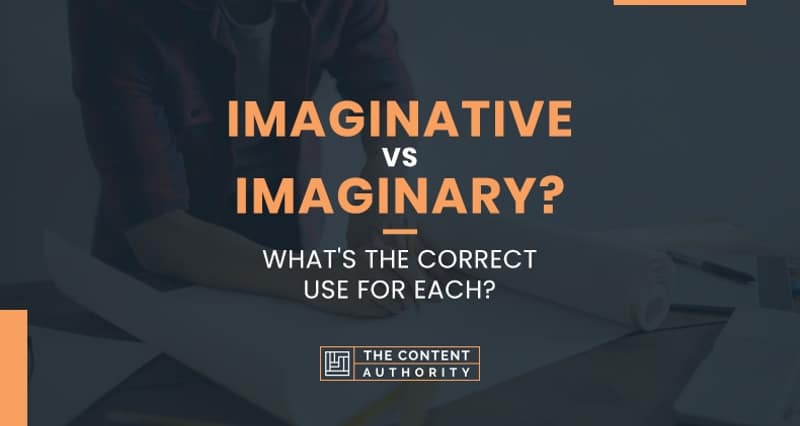The similarity of spelling of words in the English language is a common challenge for English speakers, whether they are native speakers or speak it as a second language. In this particular article, we will go over the differences, similarities, and proper use of the words “imaginative” and “imaginary.
The word “imaginative” is an adjective and we use it when talking about someone or something that is original and inventive. Now, the word “imaginary”, also an adjective, refers to that which exists only in a person’s imagination, something that is unreal and non-existent in reality.
As we move forward we will go over the origin of each word, how to use them in sentences, among other interesting facts on both of them. Stick around and read on for more.
Etymology And Meaning Of The Word “Imaginative”
The origin of “imaginative” comes from the late 14th Century word “ymaginatyf”, which means “pertaining to the imagination”, or “given to imagining”. The word is also connected to the Old French word “imaginatif” and it has a direct connection to the Medieval Latin word “imaginativus”, which is also connected to the stem of “imaginat” and, the Latin word “imaginari” which means “picture oneself”.
The most modern use of the word “imaginative” as we know it today, connects to the year 1829.
The initial meaning of “imaginative”, the one that derives from the Middle French is “of the imagination, having a strong imagination, shrewd“. The most current meaning is “to show creativity or inventiveness”, it can also be defined as “someone that is visionary”. A person that is “imaginative” is a person that is “clever”, “original”, someone that “shows quick intelligence”, a person that easily comes up with something out of the bag.
Etymology And Meaning Of The Word “Imaginary”
The etymology of “imaginary” is similar to “imaginative”. The first thing these words have in common is that both of their root words come from the 14th Century, however “imaginary” comes from the word “ymaginaire” not “ymaginatyf”.
The word “imaginary” also comes from the Late Latin “imaginarius”, in the literal sense this word means “pertaining to an image”, it can also be defined as “seeming, fancied”. “Imaginary” is also derived from the Latin word “imaginari”, which means “to picture oneself”. The term as we know it was first used in 1789, and it was used often as an entire phrase referring to “an imaginary friend””.
When Should You Use “Imaginative”?
The correct use of a word will depend one hundred percent on their role, grammatically speaking in a sentence. In this case for the word, “imaginative” is an adjective.
Adjectives are used to describe qualities and state of being of nouns. They can also be used to describe quantity but that is not all an adjective can do, they can be used to modify nouns and complement linking verbs.
So, when using “imaginative” in a sentence we need to make sure to place it appropriately, keeping present that wherever we use it, it will be adding qualities and modifying a noun, offering a meaning or interpretation related to originality, cleverness, and someone with vision to create or “imagine” something beyond what is in front of them.
Sentence Examples With the Word “Imaginative”
- Children’s imaginative minds can craft the most amazing things out of thin air. The other day my five-year-old cousin was talking to an ant and say it talked back.
- I do appreciate an imaginative mind but there are instances where it can be downright annoying.
- There is nothing like a good science fiction book to get imaginative minds flying away.
- He could certainly admire how they made an uncomfortable event into an imaginative entertaining event.
- The street performer was quite imaginative, he had us mesmerized with his tricks and the magic routine.
- My teacher insisted the short story had to be fresh and imaginative. I worked so hard on it and I still didn’t get an A, in my head, it was the most out-of-this-world narrative I had ever heard but it was not that good to her.
- His imaginative skills were so good everyone envied him. However, he never knew and always demanded more of himself.
- The Grimm Brothers were two of the most gifted storytellers history has known. They were witty and imaginative and gathered common stories all around and turned them into legends.
- I could not believe how lacking the engineers were. They were not imaginative at all, and they ended up adding the additional bathroom outside of the house when there was clearly plenty of room in the little room under the stairs.
- Imaginative illustration and quality narrative is the best way to create a magical world that engulfs the reader in a novel. If done right it transcends the pages and creates a reality that seeps through the life of those who read it.
Synonyms of “Imaginative”
There are many synonyms that can be used in place of the word “imaginative”, here are some of the most common and some sentence examples with them.
- Creative
- Visionary
- Inventive
- Ingenious
- Whimsical
- Innovative
Examples With “Imaginative” Synonyms
- My uncle was the creative one in the family. It is a shame that to live off your art you need to struggle so much. He ended up taking a job at an office.
- Criminal psychologists need to be inventive to understand how criminal minds work.
- Her mind was as whimsical as a children’s story forest. You could never know what she was going to come up with.
- They managed to be innovative after all these years, they never disappoint.
- She came up with a visionary rendition of something that we all thought could not be improved.
When Should You Use “Imaginary”?
The word “imaginary” is also an adjective, it has the same use as any other adjective, it will modify a noun, give it quality, aid us in defying something or someone.
When using “imaginary” in a sentence, it will take the place of the adjective and it will assign a meaning to the noun, object, or linking verb we use it with. A meaning related to all things connected to our imagination, not necessarily physically present or possible, sometimes only existing in a person’s head or in books.
Sentence Examples With the Word “Imaginary”
- I had many imaginary friends growing up, most of them disappeared before I turned eight. Later I found out the house I lived in as a child was haunted. That changed things.
- It never ceases to amaze me how people take advice from others when they are desperate whether the advice offered is imaginary or factual.
- The doctor believed that imaginary friends are normal at certain ages for children but if it goes on beyond childhood then it might a reason for concern.
- If you have ever read any of Isabel Allende’s books you know that the magical realism and the imaginary scenery in her novels stay with you forever.
- The theories presented around the political situation in Africa seemed imaginary at first but got all too real all too quickly.
- The way people are treated sometimes makes me think that human rights are imaginary or just a suggestion.
- Children love to have their own imaginary space to play. From imaginary kitchens to treehouses, friends, and even magical kingdoms.
- Many people believe that the Zodiac signs and astrology are imaginary. Things made up to control and separate people in times where there was not enough understanding of how these things worked.
- In his old age, he had imaginary musings of his war days. Later, dementia started to set in and he actually believed himself to be in the middle of the war and he had to be restrained.
- When we played Pictionary I had to act out with my hands an imaginary hoop and basketball being thrown so people would guess the movie.
Synonyms of “Imaginary”
Here is a list of the most common synonyms of the word “imaginary” that can be used in sentences and maintain the same meaning.
- Fictional
- Fictitious
- Fabricated
- Mythical
- Unreal
- Make-believe
- Figmental
Examples With “Imaginary” Synonyms
- The world created for The Lord Of The Rings was fictitious but while watching the films you became submerged in that world and forgot it was make-believe.
- The stuff she said seemed so fabricated, that is when I knew then and there she had always lied. Nothing she ever said was true.
- As the creature emerged it looked so unreal. Who knows what you could encounter in the depths of the ocean.
- For their Halloween decorations, they decided to go with a mythical haunted house theme. They bought tons of fake spider web, smoke machines, and everything they could think of to make it all happen.
- Make-believe ghost stories were my favorite growing up.
Conclusion
After going over this article and taking in the information provided we are certain you will do great if you ever need to set “imaginative” from “imaginary” apart, or vice versa. Always remember, the first one “imaginative” is used when speaking of cleverness, and “imaginative” when something is of the imagination, or just not plausible in real life.
Shawn Manaher is the founder and CEO of The Content Authority. He’s one part content manager, one part writing ninja organizer, and two parts leader of top content creators. You don’t even want to know what he calls pancakes.




